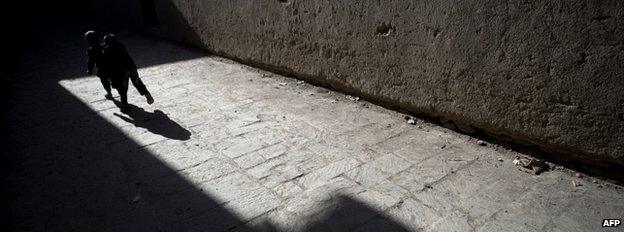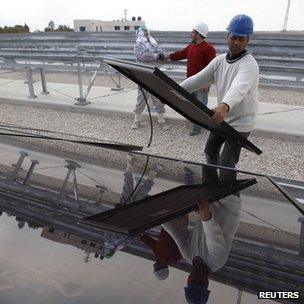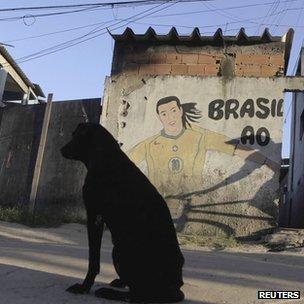Rio: Money flows and commitment woes
- Published
- comments

Ban Ki-moon wants Rio+20 to move less developed societies out of the economic shadowlands
In his most recent blog, external on preparations for the Rio+20 summit, external, Sha Zukang, the secretary-general of the conference, declares that the previous two months saw "intensive efforts to strengthen the zero draft of the outcome document".
"There is no doubt that Member States are working extremely hard to ensure that world leaders renew political commitments for sustainable development at Rio+20," he writes.
As he notes in his post, and as many other observers have maintained along the way, an outcome that puts our global society on a truly sustainable footing needs to contain more than generalities, platitudes and a wish-list.
One example concerns energy. The G20 has declared on several occasions that fossil fuel subsidies should end; Rio+20 has the potential to set a timetable.
Marine protection in waters beyond national jurisdiction, an upgrading of the UN Environment Programme's status, and a comprehensive programme on ocean acidification are among other concrete measures that have been suggested.

Observers fear protection for ocean life is being whittled away as talks progress
We're now into the second round of informal consultations on the "zero draft, external", the initial draft outcome document drawn up by the co-chairs of the process.
And reports back from environment groups observing the talks in New York present a different narrative from Mr Sha's - a narrative in which the zero draft is being watered down rather than enhanced.
The first thing to say is that it's a lengthy and complex process in which various blocs of countries test the water, deploy negotiating tactics and conceal their true hands - all of which contributes to the fact that so many of these negotiations go well beyond the wire, in this case the end of Friday 22 June, Rio de Janeiro time.
At one stage, the text had swollen from its initial 19 pages to 278, after governments submitted amendments, revisions, and alternative wordings.
Now it's coming down again - to just 157 last Friday - which is certainly good for the sanity of anyone trying to make sense of it, and presumably for anyone involved in the discussions as well.
And we're clearly still very much in that preliminary skirmishing phase. With talks continuing, some of what I've written may be out of date by the time you read it.

Solar panels are becoming much cheaper, with deployment in rich and poor countries
But I think some trends and some sticking points are discernible.
Money is shaping up to be a big issue.
As in the UN climate change and biodiversity negotiations, developing countries are saying here that they'll take on board green ideas - but at a price.
At one point, the powerful G77/China bloc, external of 131 developing countries suggested that the outcome document should explicitly speak of the need to mobilise "necessary and predictable resources" of an unspecified amount by 2020 "for meeting the goals" agreed at Rio+20.
Bearing in mind that recent climate change and biodiversity agreements both talk of sums in the order of $100bn per year by 2020, and that the Rio+20 agenda is far broader, you can guess at the sums of money that might be requested here.
Developed nations that would be expected to foot the bill are opposing such a clause. Many are in severe debt, with China itself holding a sizeable proportion of the IOUs.
But developed nations such as the US, Japan and parts of Europe have been resisting attempts to include language that would admit they're failing to meet existing pledges on finance, such as providing 0.7% of GDP in overseas aid.
The zero draft's simple commitment to phasing out "environmentally harmful" subsidies on things like fossil fuels, fisheries and agriculture is also being slowly weakened.
The idea that a fossil fuel subsidy phase-out should be gradual so as to prevent damaging impacts on poor societies clearly has social merit; but there's no reference to the phase-out happening faster in rich countries.

Tens of thousands of delegates are expected in Rio, including more than 100 world leaders
Japan and the US have tried to delete language on ending agricultural and fisheries subsidies. Canada wants fossil fuel subsidies to end only when they are inefficient and cause "wasteful" consumption.
A number of blocs including the EU have suggested "rationalisation" rather than "elimination" of subsidies. Firm targets and timetables remain elusive.
There's been an apparent back-sliding on the overall energy package suggested by UN Secretary-General Ban Ki-moon, external - universal access to modern energy, a doubling in the rate of energy efficiency improvement, and a doubling of the renewables share, all by 2030.
Whereas the zero draft talked of "building on" that vision, a version from last week's discussion would have the Rio+20 summit merely "taking note" of it.
Developed countries also appear to be mounting something of a co-ordinated attack on access and benefit sharing (ABS), external.
In essence, if a company from a rich country takes a natural resource from a poor country and makes billions from it, they should have to give something back.
The fine detail of this issue became the major bone of contention at the 2010 UN biodiversity convention meeting; and in the Rio+20 process, references are being deleted by countries including the US, New Zealand and Canada.
On the social side, there are some interesting positions being taken.
Iceland, for example, has proposed a goal of having at least 40% of "leadership positions" reserved for women. The Vatican has taken a stand against the proposed universal right to education including references to gender equality, family planning and reproductive health.
Perhaps most fundamentally, the basic Rio+20 premise that things need to be done differently in future does not appear to be universally shared, with the G77/China arguing that economic growth in developing countries is not only the best way to eradicate poverty and hunger, but also to restore harmony with nature.
With April yielding before May's advances, less than eight weeks remain before a summit that some insist is the final chance to reform society's currently unsustainable processes.
Does this look like a recipe adequate for such reform?